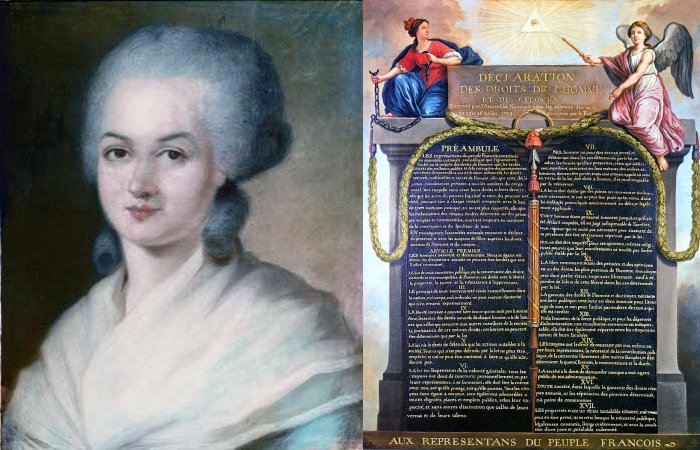Olympe De Gouges – First French Feminist Challenged Maximilien de Robespierre And The Jacobins
Ellen Lloyd - AncientPages.com - Olympe de Gouges is today remembered as a courageous female hero who fought with passion for women’s equal rights. She was the first French feminist, and she challenged fearlessly the greatest and most powerful rulers during the French Revolution.
Left: Portrait of Olympe de Gouges. Credit: Public Domain - Right: The Declaration of the Rights of Man and of the Citizen of 26 August 1789. Credit: Jean-Jacques-François Le Barbier, Public Domain
As a woman, she had the guts to speak her mind, and this made her very unpopular in a male-dominated society. She was considered so radical that she was labeled insane long after her death. Deep down, she knew that her written words and acts would cause her death. Having an enemy like Maximilien de Robespierre was disastrous in those days.
Was Olympe De Gouges truly an opponent of the French Revolution? Did she have a hidden agenda? Was she sent to the guillotine because Robespierre and his follower were eager to remove a threatening political opponent who could “poison” the views of other women? Her life story shows that those in power feared the rise of feminism during the French Revolution.
Olympe De Gouges was by no means the only woman who showed dissatisfaction with the new reforms in France.
Charlotte Corday, whom we discussed previously on Ancient Pages, was so angry with the political situation and atmosphere in France that she committed murder. Today, historians still debate whether she should be considered a true freedom fighter, a female hero, or a cold-blooded, selfish murderess.
Marie Gouze Becomes Olympe De Gouges
Born in 1748 in Montauban, Marie Gouze married Louis Aubry in 1765. The couple had a son named Pierre. When her husband died, Marie moved to Pairs in 1770 and changed her name to Olympe de Gouges. Years before the French Revolution started, Olympe De Gouges was already well-known as a controversial writer who wanted to change society. She opposed slavery and raised her voice against social injustice.
Maximilien de Robespierre criticized the French monarchy, opposed the death penalty, slavery and gained a reputation for protecting the poorest of society and as a person with strict moral values, Robespierre earned the nickname "the incorruptible".
Like many others with great ideas, she was full of enthusiasm and hope, at the beginning at least. Soon, she saw the revolution in her home country took a different turn than she had expected. The new reforms did not improve women’s conditions. Disappointed and angry, Olympe De Gouges published in 1791 the Declaration of the Rights of Woman and the Female Citizen, a radical paper that questioned French laws. She pointed out that the French constitution must guarantee all humans equal rights, but it was obvious the new laws were only beneficial to men. Women had been deliberately forgotten, and their social conditions were as horrible as ever.
She opened her declaration with the famous quote, "Man, are you capable of being fair? A woman is asking: at least you will allow her that right. Tell me? What gave you the sovereign right to oppress my sex?"
"The happiness and well-being of society would only be insured once the rights of women were equally important as those of men, especially in political institutions", she wrote.
Olympe De Gouges Criticizes Maximilien de Robespierre And The Jacobins
Olympe De Gouges raised her voice against Maximilien de Robespierre and criticized his terror regime. She became a sensation but also a hated woman. Many said she was insane and perhaps even sought revenge on society because her marriage had failed. Yet, Olympe De Gouges did not give up. She continued to fight and published a paper demanding equal rights for women.
In 1793, the Jacobins, led by Robespierre, decided to eliminate all of their opponents. Thousands of people died during this period. It was time to get rid of Olympe De Gouges, who had just published a paper condemning the politics of the Jacobins.
The Storming of the Bastille in July 1789 is widely regarded as the most iconic event of the Revolution. Credit: Public Domain
When the police came to her apartment in Paris, the officers couldn’t find any provoking documents and they were ready to leave. However, without being forced, Olympe De Gouges showed them her secret room where she kept all her anti-Jacobins papers. She was naturally arrested at once and sent to prison.
The trial against her was held in November 1793. She was refused the right to get a lawyer who could speak in her name. It was said that she could defend herself.
Olympe De Gouges Is Sent To The Guillotine
Olympe De Gouges, who had already spent months in prison, was weak, and her health caused her problems. Yet she did her best and defended herself against the accusations, but in the end, it was obvious that it really didn’t matter what she said. The verdict was given before her trial had ended. Olympe De Gouges was accused of having written a play supporting the hated queen Marie-Antoinette, who had just been sent to the guillotine. Her plays against slavery were questioned. Her controversial, provoking writings against Maximilien de Robespierre and the Jacobins were considered convincing evidence showing she was an enemy of France and the revolution.
Olympe De Gouges received her death sentence on November 2, 1793, and was taken to the guillotine the next day.
Just a few days after her execution, Madame Roland, another feminist, was also sentenced to death.
Fearing for his life, Pierre, the son of Olympe De Gouges, took his wife and children and left France.
The French movement quickly prohibited women from participating in political activities, such as meetings and debates. Women should take care of the household and not commit crimes by getting involved in politics, the Jacobins declared.
Olympe De Gouges did not win her war against the male tyrants who were in power at the time, but she did make a difference. She inspired other women who followed in her footsteps.
Updated on February 11, 2024
Written by Ellen Lloyd – AncientPages.com
Copyright © AncientPages.com All rights reserved. This material may not be published, broadcast, rewritten or redistributed in whole or part without the express written permission of AncientPages.com
Expand for referencesMore From Ancient Pages
-
 Amazing Archaeological Discovery In A Secret Underground Structure In Transylvania Could Rewrite Ancient History
Featured Stories | Feb 13, 2024
Amazing Archaeological Discovery In A Secret Underground Structure In Transylvania Could Rewrite Ancient History
Featured Stories | Feb 13, 2024 -
 Ancient Egypt Life and Death in the Valley of the Kings Death
Civilizations | Sep 2, 2015
Ancient Egypt Life and Death in the Valley of the Kings Death
Civilizations | Sep 2, 2015 -
 Remains of Santorini Volcanic Eruption Discovered West Of Suez Canal
Archaeology | Jan 3, 2016
Remains of Santorini Volcanic Eruption Discovered West Of Suez Canal
Archaeology | Jan 3, 2016 -
 Unexpected Discovery Of Viking Trading Place In Norway Re-Writes History
Archaeology | Jul 22, 2020
Unexpected Discovery Of Viking Trading Place In Norway Re-Writes History
Archaeology | Jul 22, 2020 -
 Ancient Babylonian Astronomical Records Confirm Slowing Of Earth’s Spin
Archaeology | Dec 20, 2016
Ancient Babylonian Astronomical Records Confirm Slowing Of Earth’s Spin
Archaeology | Dec 20, 2016 -
 Mysterious And Magnificent Pasha Gardens Built For Unknown Reasons
Featured Stories | Oct 8, 2018
Mysterious And Magnificent Pasha Gardens Built For Unknown Reasons
Featured Stories | Oct 8, 2018 -
 What Was Legio Martia And Why Were The Roman Soldiers Called The Martians?
Ancient History Facts | Jan 5, 2018
What Was Legio Martia And Why Were The Roman Soldiers Called The Martians?
Ancient History Facts | Jan 5, 2018 -
 Bizarre Meat-Eating Dinosaur Found In Classic Fossil Site In Egypt’s Sahara Desert
Archaeology | Jun 9, 2022
Bizarre Meat-Eating Dinosaur Found In Classic Fossil Site In Egypt’s Sahara Desert
Archaeology | Jun 9, 2022 -
 Girl’s Ancient Tooth Solves One Of The Biggest Mysteries Of The Denisovans
Archaeology | May 17, 2022
Girl’s Ancient Tooth Solves One Of The Biggest Mysteries Of The Denisovans
Archaeology | May 17, 2022 -
 On This Day In History: Sir Thomas Brisbane, Astronomer, Soldier And Governor Was Born – On July 23, 1773
News | Jul 23, 2016
On This Day In History: Sir Thomas Brisbane, Astronomer, Soldier And Governor Was Born – On July 23, 1773
News | Jul 23, 2016 -
 Ancient Reptilian-Like Humanoids Hold Secrets Of Mankind’s Origin
Ancient Mysteries | Apr 12, 2014
Ancient Reptilian-Like Humanoids Hold Secrets Of Mankind’s Origin
Ancient Mysteries | Apr 12, 2014 -
 Five Magnificent Engraved Ancient Tombs Discovered Near King Merenre Pyramid In Saqqara, Egypt
Archaeology | Mar 19, 2022
Five Magnificent Engraved Ancient Tombs Discovered Near King Merenre Pyramid In Saqqara, Egypt
Archaeology | Mar 19, 2022 -
 Why Is The Black Prince Still A Controversial Historical Figure?
Ancient History Facts | Aug 15, 2019
Why Is The Black Prince Still A Controversial Historical Figure?
Ancient History Facts | Aug 15, 2019 -
 Discovery At Fujiwarakyu Palace Complex Offers Better Glimpse Of 7th-Century Japan
Archaeology | Oct 21, 2015
Discovery At Fujiwarakyu Palace Complex Offers Better Glimpse Of 7th-Century Japan
Archaeology | Oct 21, 2015 -
 Unique 9,000-Year-Old Shrine With Symbols Discovered At Neolithic Ritual Site In Jordan Desert
Archaeology | Mar 7, 2022
Unique 9,000-Year-Old Shrine With Symbols Discovered At Neolithic Ritual Site In Jordan Desert
Archaeology | Mar 7, 2022 -
 Largest Ever Human Family Tree: 27 Million Ancestors Mapped
Archaeology | Feb 25, 2022
Largest Ever Human Family Tree: 27 Million Ancestors Mapped
Archaeology | Feb 25, 2022 -
 Uniquely Well-Preserved Medieval Kitchen Unearthed North of Moravia
Archaeology | Aug 11, 2022
Uniquely Well-Preserved Medieval Kitchen Unearthed North of Moravia
Archaeology | Aug 11, 2022 -
 Hayk – Legendary Patriarch And Founder Of Armenia Who Defeated King Bel Of Babylon
Featured Stories | Feb 10, 2022
Hayk – Legendary Patriarch And Founder Of Armenia Who Defeated King Bel Of Babylon
Featured Stories | Feb 10, 2022 -
 Enigma Of Mount Ararat – Researchers Are Determined To Reveal The Truth To The World
Featured Stories | Jun 27, 2014
Enigma Of Mount Ararat – Researchers Are Determined To Reveal The Truth To The World
Featured Stories | Jun 27, 2014 -
 Strange Story Of The Viking Who Mysteriously Vanished And Ended Up In America By Mistake – He Was Not Happy About It!
Vikings | Jan 7, 2025
Strange Story Of The Viking Who Mysteriously Vanished And Ended Up In America By Mistake – He Was Not Happy About It!
Vikings | Jan 7, 2025



